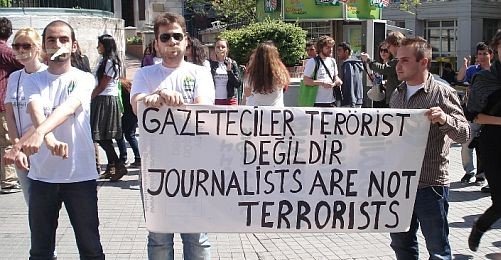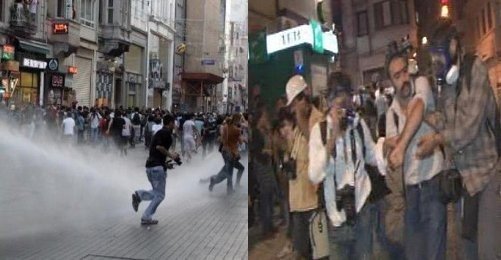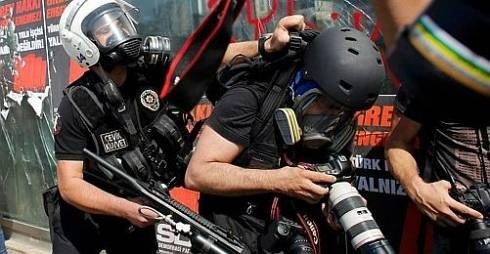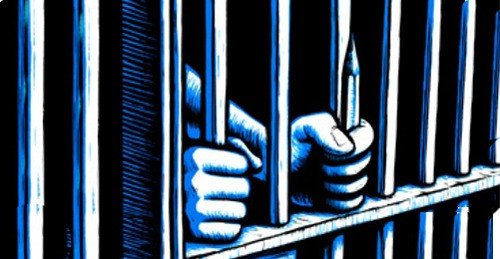BIA MEDIA MONITORING 2012 JAN-FEB.-MARC.
Journalists Rise Against Anti-Terror Law


During the period covering the 2012 months of January-February-March, the professional media bodies were constantly protesting the detention and arrest of journalists. The professional bodies also protested the closing-down of the Özgür Gündem (Free Agenda) newspaper, the non-unionization movement at the Anatolia News Agency (AA), the Anti-Terror Law (TMK), and the Special Authority Courts during the period. The media bodies followed the court hearings and criticized the government's attitude towards imprisoned journalists throughout the three-month period. They released statements regarding the judicial reform and the freedom of press and expression.
Solidarity with Özgür Gündem newspaper: The İstanbul 14th High Criminal Court, citing 'propaganda in connection with a terrorist organization,' closed down the Özgür Gündem newspaper for the news report, commentary and photographs it published on 24 May. The decision to suspend the publication of the newspaper was lifted on 30 March.
Following the suspension decision, the Turkish Writers' Union (TYS), the International Press Institute Association (IPI), the Turkish Journalists' Association (TGC), the Freedom for Journalists Platform (GÖP), the Turkish Journalists' Union (TGS), the Contemporary Journalists' Association and the Platform for Solidarity with Arrested Journalists (TGDP) and Republican People's Party (CHP) Head Kemal Kılıçdaroğlu made statements and criticized the decision.
Parliamentarians from the Peace and Democracy Party (BDP), journalists, readers of the newspaper and professional media bodies gathered in Taksim to extend support to the newspaper and to react against the suspension decision.
The Ministry of Justice, in a statement on 27 March, announced that the closing-down of press and media organizations will be rendered impossible following the adoption of the "package for the speeding up the judicial services," which was submitted to the Turkish Grand National Assembly in January.
"Non-unionization" movement at the Anatolia News Agency (AA): The Turkish Journalists' Union Head Ercan İpekçi stated that the non-unionization movement at the Anatolia News Agency, which began after Kemal Öztürk took over the management, has speeded up on 5 March. İpekçi initiated a hunger strike on 9 March in protest of the movement. Besides deputies Sezgin Tanrıkulu, Emine Ülker Tarhan, Veysel Ağbaba, Yakup Akkaya from the Republican People's Party (CHP), institutions such as the Civil Servant Unions (KESK), the Freedom and Democracy Party (ÖDP), the Workers' Party (İP) and the Confederation of Revolutionary Trade Unions of Turkey (DİSK) handed their support to İpekçi. İpekçi ended his strike with a press statement on 15 March.
During the period, the Freedom for Journalists Platform (GÖP), the European Federation of Journalists (EFJ), the International Trade Union Confederation (ITUC) and the G-9 Journalist Organizations Platform gave their support to İpekçi through the statements they made.
The Anatolia News Agency, in a statement it made on allegations against it, said that İpekçi is misleading the public.
Lift the Anti-Terror Law and Special Authority Courts: Republican People's Party (CHP) Deputy Oktay Ekşi submitted a bill of law on 2 January, demanding that Articles 6 and 7 of the Anti-Terror Law are lifted. Ekşi stated that these articles are used to 'tyrannize' journalists. During the period, unions, bar associations, political parties, the Turkish Publisher's Association, the Turkish Writers' Union (TYS), the Contemporary Journalists' Association, the Turkish Journalists' Union, the Journalist Friends of Ahmet and Nedim (ANGA), the Platform for Solidarity with Arrested Journalists (TGDP), the Turkey Centre of PEN International, the Initiative of Freedom of Thought, and the Contemporary Lawyers Association gathered and made statements calling for the lifting of the Anti-Terror Law and the Special Authority Courts. The Millions Want Justice launched a campaign for the lifting of the Anti-Terror Law and the Special Authority Courts.
Unsubstantial news report/disclaimer: During the three month period, the Peace and Democracy Party's (BDP) Headquarters announced that the news report, "Bullet killing police was fired from the BDP building" published on 22 March in the Yeni Şafak (The New Dawn), Bugün (Today) and Yeni Akit (The New Treaty) Newspapers is not true. The Executive Committee of the People's Democratic Congress (HDK) protested the news report, "HDK will be established to replace KCK, which has been deciphered," published on 6 March on Habertürk (Newsturk) and Bugün newspapers. The Association of Human Rights and Solidarity for Oppressed Peoples (MAZLUMDER) published a disclaimer about a news report published in the Taraf (Side) newspaper on 8 March.
OdaTV statements: During the period, the professional media bodies followed the OdaTV hearings. Deputy Sevim Dağdelen of the Germany's Left Party, the International Press Institute (IPI), the Freedom for Journalists Platform (GÖP), and Turkish Journalists' Association demanded that the journalists are tried in line with the procedural and punitive provisions and without being under arrest.
The International Press Institute announced its pleasure over the acquittal of journalist-writer Doğan Yurdakul, who was standing trial in the Odatv case.
On 3 March, on the first anniversary of the arrest of Ahmet Şık and Nedim Şener, the International Press Institute condemned the fact that "IPI World Press Freedom Hero" Nedim Şener has been under arrest for a year. The Financial Times published a news report by Daniel Dombey on the Şık and Şener trials. The Journalist Friends of Ahmet and Nedim (ANGA) organized a march in Taksim. Hundreds of people, including Şener's wife Vecibe Şener, Şık's wife Yonca Şık, Hrant Dink's brother Hosrof Dink, journalist Banu Güven, Platform for Solidarity with Arrested Journalists (TGDP) Speaker Necati Abay, Republican People's Party (CHP) deputies, relatives of the missing and artists marched, carrying a banner that read, "We Will Touch Even if we Burn."
On 12 March, on the acquittal of Nedim Şener, Ahmet Şık, Sait Çakır and Coşkun Musluk, the International Press Institute Turkey Committee, the Freedom for Journalists Platform, the Turkish Journalists' Association, the Turkish Journalists Federation and the International Reporters Without Borders (RSF) published statements. The organizations expressed pleasure over the acquittals, and reiterated that they would continue their struggle for the freedom of other arrested journalists.
The International Reporters Without Borders (RSF) demanded that the threats against Şık and Şener over twitter following their acquittals should be investigated.
"Ve Yine Marko Paşa" (And Marco Pasha Again) prepared by the Journalist Friends of Ahmet and Nedim was distributed with Birgün (One Day) and Evrensel (Universal) newspapers on 12 March and with the Leman magazine on 14 March. The articles by many arrested and free journalists on freedom of expression were published in the newspaper.
Attacks-condemnations: The Turkish Journalists' Federation (TGF), IPI, RSF and the Turkish Journalists' Association condemned attacks against the Zaman (Time) newspaper's offices in the cities of Cologne and Bonn in Germany, and in Paris on 16 February, and the attack against the same newspaper's offices in the city of Rotterdam in the Netherlands on 20 March. The organizations demanded that the assailants and instigators are found as soon as possible.
KCK protests: In the three-month period, the KCK (Koma Civakên Kurdistan-Union of Communities in Kurdistan) operations were protested. The Followers of Justice for Children (ÇİAT) group launched a petition campaign on 15 March to protest the arrest of writer/former Evrensel journalist Müge Tuzcu. The Dicle News Agency (DİHA) organized a press conference on 12 March about the raid on the DİHA Adana bureau, which uncovered the events at the Pozantı Prison and the arrest of DİHA Adana reporter Özlem Ağuş. Altyazı Aylık Sinema Dergisi (Subtitle Monthly Movie Magazine), Ankara Uluslararası Film Festivali (Ankara International Film Festival), docIstanbul Belgesel Araştırmaları Merkezi (docIstanbul Documentary Research Centre), Documentarist Uluslararası Belgesel Film Festivali (Documentarist International Documentary Film Festival), Filmmor Uluslararası Kadın Filmleri Festivali (Filmmor International Women's Film Festival), İşçi Filmleri Festivali (Workers' Film Festival), Sinesen, Uçan Süpürge Uluslararası Kadın Filmleri Festivali (Sinesen Flying Broom International Women's Film Festival), Yeni Film Dergisi (New Film Magazine) and many people from the cinema sector protested on 15 February the detention of director Mizgin Müjde Aksan and director of photography Özay Şahin within the scope of KCK operations.
Internet bans: In the 'Enemies of the Internet' list published by RSF on 12 March World Day Against Cyber Censorship, Turkey was listed among 'countries under surveillance.'
The Alternative Information Technologies Association announced on 6 February, that the news report by Information Technology and Communications Institution (BTK) on the 'Safer Internet Day' stating that 'the Internet filter is being supported by European institutions,' is misleading. With the initiative of the Association, over one hundred academicians launched a petition campaign on 9 January demanding "uncensored safe internet." In the text of the campaign, it was stated that it is unacceptable for senates to support implementations that restrict freedom of expression.
On 18 January, an Internet blackout was organized in many countries including Turkey to protest the Stop Online Piracy Act (SOPA), scheduled to be adopted on 24 January. Following the protests, the USA Senate announced that it has indefinitely postponed a vote on the act.
The government's attitude/reactions: Throughout January-March, Prime Minister Recep Tayyip Erdoğan and Minister of European Union Affairs and Chief Negotiator Egemen Bağış made some allegations about the arrested journalists. Freedom for Journalists Platform (GÖP), Turkish Journalists' Association, Contemporary Journalists' Association and the Platform for Solidarity with Arrested Journalists (TGDP) published statements on these allegations. The Republican People's Party (CHP) İstanbul Deputy Umut Osran submitted a parliamentary question to be answered by Justice Minister Sadullah Ergin. CHP İstanbul Deputy Melda Onur submitted an information request petition to the Prime Ministry. In the parliamentary question and the petition, it was asked who the allegedly "rapist, robber" imprisoned journalists were.
In a statement on 19 January on a decision Denmark made on Roj TV, the Foreign Ministry said that ''through a court decision it has been confirmed that PKK is a terrorist organization, that Roj TV is making propaganda on behalf of PKK and promoting terrorism, and that the channel is being controlled and financed by the PKK.''
Turkish Journalists' Association Head Orhan Erinç, with the decision of the Board of Directors, wrote a letter to Prime Minister Recep Tayyip Erdoğan on 26 January. Erinç, in his letter, demanded that the journalists' attrition right is restored, the Press Labour Law (Basın İş Kanunu) is implemented for all journalists and that the inequalities in the service raise practice is overcome. Deputy Prime Minister Bekir Bozdağ announced that steps might be taken to restore the journalists' attrition right.
Balbay/Özkan hearings: throughout the period, professional media organizations followed the hearings of Tuncay Özkan and Mustafa Balbay, the defendants of the Ergenekon trial, who have been arrested pending the outcome. The Press Council Higher Board Members and İzmir Journalists' Society met with Özkan and Balbay. Freedom for Journalists Platform (GÖP), European Federation of Journalists (EFJ) in their statements about Özkan and Balbay, demanded amendments to the legal definitions of terrorist and journalist.
Judicial reform: During the three-month period, Human Rights Watch (HRW) and RSF announced that the third judicial package, which has been waiting at the Turkish Grand National Assembly, and which introduces a conditional pardon to media trials, does not offer a solution for the basic problems regarding the freedom of expression. The organizations stated that the legal amendments would lead to a 3-year suspension of the media trials, which is estimated to be around 5 thousand. The trials would be cancelled if an equivalent offense has not been committed during the period. They stated however, that the releases would remain inadequate since the judiciary would continue to categorize certain media offenses as 'terrorism' and prolong arrests arbitrarily.
Support for imprisoned journalists: During January-March, the organizations handed support to journalists regarding freedom of expression. PEN Turkey, the Turkish Writers' Union, the Professional Association of Translators and the Publishers' Association of Turkey organized the "Freedom of Thought and Expression from 12 to 12" symposium.
The Ankara Initiative for Freedom of Thought and the Friends of Belge, Contemporary Lawyers' Association (ÇHD), Human Rights Association (İHD), The Human Rights Common Platform (İHOP), the Civil Servant Unions (KESK), the Chamber of Geological Engineers and the Turkish Doctors' Union (TTB) organized a solidarity evening at the Ankara Sanat Theatre for journalist writer Ragıp Zarakolu.
Zeynep Oral, Halil İbrahim Özcan, Sabri Kuşkonmaz, Tarık Günersel and Doğan Akhanlı visited Zarakolu at the prison. The deputies of the Swedish Left Party and the Environmentalist Green Party applied to the Nobel Peace Committee for Zarakolu and proposed that 2012 Nobel Peace Prize is given to Zarakolu.
Day of Journalists: On the "10 January Day of Working Journalists" Deputy Prime Minister Bülent Arınç met with the representatives of journalist associations and organizations. CHP İstanbul Deputy Melda Onur came to parliament with black handcuffs and a black t-shirt to represent the imprisoned journalists. Contemporary Journalists' Association opposed the dismissal and arrest of journalists and demanded that all journalists are freed. The second issue of the Tutuklu Gazete (Arrested Newspaper) by imprisoned journalists was published on 10 January. The newspaper was distributed with Aydınlık, Birgün, Evrensel newspapers on 10 January and Atılım (Leap) newspaper on 14 January.
Reports-freedom of expression statements: During the three-month period the organizations published many reports on violations of freedom of expression. Turkish Journalists' Association on 7 March, announced that Turkey, in 2011, was 148th among 179 countries in terms of freedom of expression and working conditions of journalists. RSF stated on 1 March that it is pleased that the French Constitutional Council has deemed a proposed law punishing the "denial of legally recognized genocides," as unconstitutional. RSF also called on Turkey to "decriminalize two offences, insulting the Turkish nation (article 301 of the criminal code) and insulting the memory of Mustafa Kemal Atatürk (Law 5816 of 25 July 1951). The RSF had called on the French parliamentarians on 26 January, to object to the genocide denial law, which was approved by the Senate and which punishes the denial of Armenian genocide with a prison sentence and a fine. According to the 2011-2012 World Press Freedom Report published by RSF on 25 January, Turkey is 148th among 179 countries. Last year its rank was 138. The report stated that tens of journalists have been imprisoned without being tried within the scope of Ergenekon and KCK cases, using fight against terrorism as a pretext. It added that arrests, telephone tapping, and belittling the journalists' news sources are creating a climate of threat in the media.
The Contemporary Lawyers' Association (ÇHD) İstanbul Branch's Prison Monitoring Committee, in its report published on 30 January, stated that in general, Azadiya Welat, Özgür Gündem, Evrensel, Cumhuriyet (Republic) and Birgün (One Day) newspapers are not allowed in prisons.
Human Rights Watch, in the Turkey section of the World Report published on 22 January, listed the defects of the judicial system. It stated that the prosecutors frequently prosecute individuals for non-violent speeches and writings. The report adds that the fact that Ahmet Şık, Nedim Şener, Büşra Ersanlı and Ragıp Zarakolu are arrested and imprisoned on terrorism charges is particularly an issue of concern.
Thomas Hammarberg, Commissioner for Human Rights of the Council of Europe, wrote a report about his visit to Turkey on 10-14 October. The report named "Administration of justice and protection of human rights in Turkey" stated that the long detention periods openly violate the law.
The Turkish Journalists' Federation (TGF) in the final declaration prepared following the 36th Council of Presidents Meeting, drew attention to the problem of arrested journalists and demanded that journalists are tried without being arrested.
Journalists fired because of their articles
Indefinite leave for Nuray Mert: Nuray Mert was the last journalist to be dismissed because of her opposing views. It was alleged, on 12 February, that the columnist had been given an 'indefinite leave' by the Milliyet (Nationality) management and her article dated 19 February was not published. Mert, on 21 February, made the following statement: " We all know very well the current deterioration of conditions of all sorts of freedoms in Turkey. Some people like my political stance and some do not; however, rather than silencing me or celebrating my forced leave, those who do not like my views should have tried either to have a debate with me or to totally ignore me. Unfortunately, things did not develop that way."
Mehmet Altan quit Star: Mehmet Altan quit the Star newspaper on 18 January after his article was not published. His cousin Sanem Altan tweeted about Altan's decision to quit Star: "They asked Mehmet Altan to deny the comments he made to ANF. When he refused, they did not publish his article. The people around the Prime Minister have gone mad...". Mehmet Altan stated that he now sees a Turkey where a certain authority decides on what is to be and what is not to be published.
Temelkuran was dismissed: Columnist Ece Temelkuran announced on 4 January on Twitter that Habertürk newspaper had parted ways with her. Temelkuran, in her last article, had written about the Uludere massacre, and had heavily criticized Prime Minister Erdoğan's comments about the incident. In her article named "Ban After Ban... (One day everyone will become Banu Güven)"dated 21 December, Temelkuran said, "Only those, who just want to practice reporting, and who feel that they cannot live without saying what they need to say, will remain and they will establish their own media."
And...
Pardon to banned books: According to media reports on 22 January, the Ministry of Justice decided to lift the 'ban' on almost 23 thousand books. Accordingly, these books will cease to serve as evidence.
The media waited for orders: After 35 people, 19 of whom were children died in Uludere, Akşam (Evening) writer Serdar Akinan was among the first journalists to go to the region. He told ANF on 4 January that, despite the fact that the media heard about the incident immediately and had the visual materials, it did not report the incident before receiving orders.
Dink murder press conference: Cem Halavurt, one of the lawyers of the Dink family, Fethiye Çetin, Professor Doctor Turgut Tarhanlı, Hrant Dink's wife Rakel Dink and his brother Hosrof Dink organized a press conference on 15 March and analyzed the report by the State Supervisory Council.
Media accreditations criticized: Turkish Journalists' Association criticized the fact that certain newspapers and television channels were not allowed to cover the military ceremony organized for the 12 soldiers, who died on 21 March in a helicopter accident in Kabul. Reporters from Taraf, Zaman, Bugün, Yeni Akit and Birgün newspapers and Cihan News Agency, Samanyolu News TV, Kanal (Channel) 7, Bugün TV, Kanaltürk (Channelturk) TV and Ülke (Country) TV were not allowed to cover the ceremony on account that they had not been accredited. Turkish Journalists' Association stated that the accreditations procedure by civilian and military institutions and organizations interfere with the public's right to receive information, which is secured by the Constitution.
ECHR decision: The European Court of Human Rights decided on 20 March to suspend the review of complaints, provided that Turkey put in place, within one year, an effective remedy affording adequate and sufficient redress for grievances raised in these complaints. (EG/EAY/BA))
BIA MEDIA MONITORING APRIL-MAY-JUNE 2012
Press Freedom Day with 95 Journalists Behind Bars!

BIA MEDIA MONITORING JANUARY-FEBRUARY-MARCH 2012
BIA Media Monitoring and Freedom of Expression Report - Full Text

BIA MEDIA MONITORING REPORT 2012 JANUARY-FEBRUARY-MARCH
‘World Press Freedom Day’ with 100 Journalists in Prison!

JOURNALIST'S GEZI LOG
"Assault, Detention, Resignation, Unemployment"

BIA MEDIA MONITORING JULY-AUGUST-SEPTEMBER 2013
Journalists and Media Gripped By Government-Police

BIA MEDIA MONITORING APRIL-MAY-JUNE 2013
#Resist Press Freedom!

BIA MEDIA MONITORING JANUARY-FEBRUARY-MARCH 2013
Happy May 3 With All Jailed Journalists!

BIA Media Monitoring 2012 / Full Text





